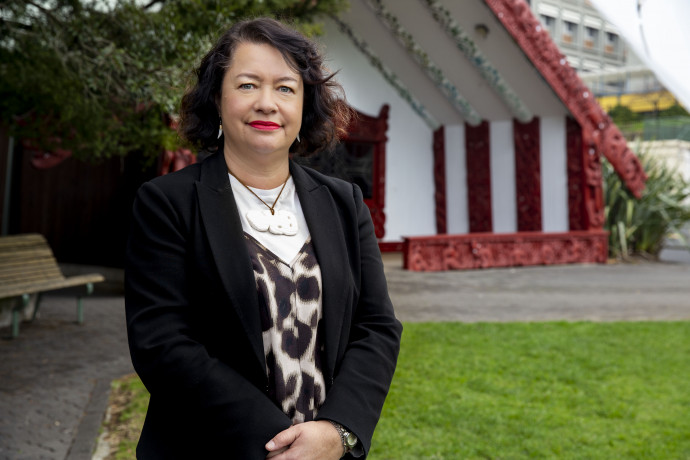2020 Early Career Research Excellence Award for Humanities: Art history on Ngāti Porou Carving

Associate Professor Ngarino Ellis (Ngāpuhi/Ngāti Porou) has received the Royal Society Te Apārangi Early Career Research Excellence Award for Humanities for her multiple award-winning first book 'Whakapapa of Tradition: One Hundred Years of Ngāti Porou Carving, 1830-1930' (2016).
This book simultaneously provides a specific Ngāti Porou art history that significantly advances knowledge in her discipline and promotes a century of work by carvers of the Iwirākau School.
As one of very few Māori art historians, Ngarino is dedicated to advancing theoretical knowledge in her field, and thus enriching the humanities more broadly, and to responding to the changing needs of Māori whānau, hapū, and iwi as well. The book also realises her strong commitment to providing historical and visual research for practicing artists.
Sole-authored by Ngarino, with photography by Natalie Robertson (Ngāti Porou/ Clann Dhònnchaidh), A Whakapapa of Tradition won four major awards: the Ockham Judith Binney Award for Best First Book Illustrated Non-Fiction (2017), the Te Mahi Toi/Arts Award (2017), the inaugural Best First Book Award (2017), and the Prize for Māori and Pacific Art Writing (2018). Extremely well-received in both public and academic domains, the book generated nine reviews, four newspaper articles, three radio interviews and two television reports. Reviewers called it both “a rich history of carving…[that] highlights the depth of possibilities evident in Māori art history and …a valuable source for Ngāti Porou (Journal of New Zealand Studies), as well as a “worthy and original study [that] maintains an ‘insider’ perspective on Iwirakau art history” (Art New Zealand).
Whakapapa of Tradition is the first in Ngarino’s planned body of work on Māori art history located in taonga tuku iho/ancestral treasures and oral narratives. In 2019 she was awarded a Marsden Fund grant as sole principal investigator for her project ‘Ngā Taonga o Wharawhara: The World of Māori Body Adornment’.
In all her work, methodologically Ngarino draws on Kaupapa Māori principles and other global-Indigenous understandings: art as a continuum, artists as part of the community, the importance of ancestral wisdom in making art and the materials used, and the value of women’s voices.
Acutely aware of her tribal responsibilities, Ngarino seeks to initiate projects that benefit her whānau, hapū and iwi. Her prolific publications reflect her emerging excellence as a Māori art historian. She is also developing a strong international reputation as a significant art historian in general.
Recognised as a promising Māori art historian, Ngarino was mentored by eminent Māori researchers Professors Ngahuia Te Awekotuku and Linda Waimarie Nikora FRSNZ on their Marsden project Tā Moko. Her current collaboration with Professor Deidre Brown and the late Professor Jonathan Mane-Wheoki on the Marsden project Toi Te Mana is further evidence of her continuing development as an excellent Māori researcher in the humanities.
A prolific author, she has published widely, and disseminated her research to international, national and local audiences including Māori communities. Regularly funded to participate in international fora, Ngarino also represents Māori and Pacific on the Art History Association of Australia and New Zealand Executive. She consistently seeks opportunities to collaborate with other scholars and students, and is an award-winning teacher, receiving an Ako Aotearoa Sustained Excellence in Tertiary Teaching in a Kaupapa Māori Context Award for her clear and consistent commitment to student empowerment and community building.
On receiving the award, Ngarino said:
“Te mea tuatahi, kei te mihi ahau ki te mana whenua o tenei rohe, tena koutou. Ki te Kahui Ariki, kei te mihi. Ki Te Apārangi, the Royal Society, thank you for presenting me with this award - this is both humbling and a privilege, especially in this year of ups and downs. To the others who have received this award past and present, kei te mihi.
“My childhood summers were spent at Te Rawhiti in the Bay of Islands running around with my cousins helping our Grampa on his very fast, illegally modified tractor to fit us all on, or traveling to Rangitukia on the East Coast for Kaa whanau reunions and incessant hours of dishes. My parents deliberately took my sister and I home to balance our lives in suburban Auckland, and in doing so imbued in me the importance of community, of being Ngāpuhi and Ngāti Porou, which set a pathway for my academic life. I remember those summers fondly.
“I pay homage to my grandparents, and especially to my Nanny, Emere Kaa Mountain in particular, to whom my PhD and later book A Whakapapa of Tradition was dedicated. This was my modest koha to Ngāti Porou. I thank those closest to me, my wonderful support team at Numbers 18 and 23: my parents, my sister, my husband and kids, whose noise and humour keeps life in balance.
“Working in this field fills me with such passion and excitement. My mahi is one small part of a growing field of Māori and Indigenous art histories. It is a great time to be a writer, when museums such as this one (Auckland Museum) are welcoming us with open arms. I look forward to the global outreach of Māori art history, where my students become my colleagues, and together we shape a world in which our taonga are connected once more and are revitalised as much as they revitalise us. The Royal Society’s continued awards and funding can help us realise this dream.”
Royal Society Te Apārangi Early Career Research Excellence Award for Humanities:
For the encouragement of early-career researchers in humanities research in New Zealand.
Citation:
To Ngarino Ellis mo tana pukapuka tuatahi, A Whakapapa of Tradition: One Hundred Years of Ngāti Porou Carving, 1830-1930, patata ki te kotahirau a nga mahi a nga tohunga whakairo o te wananga o Iwirakau (for her multiple award-winning first book A Whakapapa of Tradition: One Hundred Years of Ngāti Porou Carving, 1830-1930, about a century of work by carvers of the Iwirākau School).
